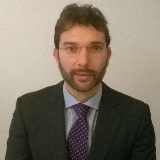Expert Interview: Luís Gargalo, Management Control Systems Department Coordinator for Wayfield, Trading Internacional, Portugal
Th e KPI Institute’s Performance Management in 2014 report is built on the belief that a balanced approach in such research endeavours can only be achieved by triangulating the opinions of practitioners, academics and consultants alike. In 2014, Luís Gargalo, Management Control Systems Department Coordinator for Wayfield, Trading Internacional, SA – Grupo Refriango, Portugal, was one of the practitioners who offered us rich insights into performance related research and trends.
e KPI Institute’s Performance Management in 2014 report is built on the belief that a balanced approach in such research endeavours can only be achieved by triangulating the opinions of practitioners, academics and consultants alike. In 2014, Luís Gargalo, Management Control Systems Department Coordinator for Wayfield, Trading Internacional, SA – Grupo Refriango, Portugal, was one of the practitioners who offered us rich insights into performance related research and trends.
“To me, the best practice is to make sure that the organizational strategy is truly connected to people. Communication is the key”.
- What does the term Performance management mean to you?
Performance Management is business improvement, is Balanced Scorecards, is planning and budgeting, forecasting, is ABC, is also strategy, but to me, it is much more than that, it is the way you connect people to strategy. If well designed, the Performance Management system will show where the organization is going, how fast it is moving and how it compares to the competition.
- What drives interest in Performance Management?
In Africa, we can currently witness a strong interest in Performance Management systems. The goal is to make operations and activities more effective and efficient. Sometimes, there is more interest in specific tools, like the Balanced Scorecard or a simple KPI system but this is just the romantic way that some people chose to look at.
- What are your thoughts on the relationship between Performance Management at organizational, departmental and individual level?
I believe in people as a company’s most valuable asset and I see, at a corporate level, performance management as the result of the work, passion and determination of people. Performance Management at the organizational level must be intimately linked to Performance Management at the individual level.
- What are the 2014 key trends in Performance Management from your point of view?
It depends on the development stage of the organization as also the market and the country. For example in Africa, nowadays, the focus goes to operations and activities but in Portugal or in Europe we find focus on strategy and communication.
- What aspects of performance management should be explored more through research?
We should be able to measure the immeasurable and evaluate the consequences of uncertainty in a much better way. I must say that I am not satisfied with the instruments that are currently used for dealing with uncertainty and I think we should all invest more time and money in order to get better instruments to evaluate the uncertainty and measure what we deem immeasurable.
- Which companies would you recommend to be looked at, due to their particular approach to Performance Management and subsequent results?
There are plenty of examples. In Angola I would say Refriango. It is an incredible example of the relationship between the individual Performance Management and the organizational level of performance.
- Which are the main challenges in today’s Performance Management practice?
I would say that the challenges are more or less the same as before, maybe now we need to cope with globalization and be flexible enough to understand that different cultures and different economies require different approaches to Performance Management, but I think that the main challenge will be the same for a long time: dealing with the risk of uncertainty and finding how to measure the immeasurable.
- What do you think should be improved in the use of Performance Management tools and processes?
We could use the network effect in order to improve the way we use Performance Management within organizations. I am not saying that we are not making use of the network at all, but I think we should work it better and deeper. Imagine that you could share what you are doing today with other guys from different organizations and vice versa, imagine that we could all use the same platform to share performance metrics and compare results. That would be a huge improvement.
- What would you consider best practices in Performance Management?
To me, the best practice is to make sure that the organizational strategy is truly connected to people. Communication is the key.
- Which aspects of Performance Management should be emphasized during educational programs?
First of all, students should be taught to develop their critical thinking ability and then, they will learn that each organization is different from another and the same organization is different when working in different countries. Students will realize that the best Performance Management system to one organization is not necessarily the best to another.
- Which are the limits in order to achieve higher levels of proficiency in Performance Management among practitioners?
I don’t see any limits, some do it with passion and achieve great results, others have passion for other fields of knowledge and they won’t be the best in Performance Management. Passion and determination are the keys to achieving the best results, whatever you choose to follow.
- If you are to name, in a few words, the main aspects governing Performance Management today, what would they be?
Leadership is one of the main aspects that drive Performance Management to the next level, if the leadership is not fully committed with Performance Management, it will not get the most out of it.
- What is your opinion on the emerging trend of measuring performance outside working hours?
To be honest, I must say that I leave Performance Management inside working hours. I admit that it is appealing to bring it to your personal life and I believe we do it already unconsciously but I prefer, at least try to keep it inside working hours.
- Are you using any kind of personal performance measurement tools? If yes, please describe how this has influenced your life.
No, definitely not. Some friends and I frequently join for jogging and some of them use mobile apps that measure their performance, race after race, pace after pace, but I keep saying to them: “that is not healthy guys, seize the running, without always looking to the cell phone”.
- Do you have any tips for successfully managing one’s work-life balance? What are your thoughts?
Leave your work in the office, do your best every day, live your work with passion. Love your family, your friends and your dog as if today is the last day of your life. Don’t mix it together. Leave the work in the office.
16: Which are the recent achievements in generating value as result of Performance Management put in practice in your organization?
I have been implementing a Performance Management system in Angola since 2010 and today we know that more than 6.000 employees in the organization are aware of what they are doing, how their input generates value to the organization, they know where we were yesterday, where we are today and where we expect to be tomorrow. We all know how we compare to the competition and what we should do next.
For more interviews with specialists in the field, peruse through our report Performance Management in 2014! Should you be interested in having your interview featured in one of our publications, contact us at [email protected]!

Tags: Interview, Performance Management in 2014, Practitioners





